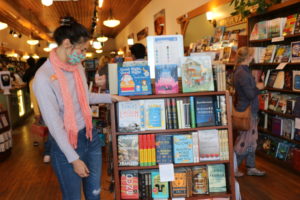Buying unique local gifts may be more than the smart thing to do in 2021.
The Western hemisphere’s two largest shipping container ports are Los Angeles and Long Beach, each about an eight-hour drive from Flagstaff.
The supply chain problems are not a new issue, according to Edmund Bushman, chair of the Yavapai Community College School of Business and Computer Science. “It started with COVID over 18 months ago; consumer goods were just not being produced and supply was lacking,” he said.
With each passing month since then and the pandemic-induced demand spike, officials at the ports have watched delays for unloading containers increase with each passing month. In earlier times, containers would be unloaded from ships and sit at the docks for just a few days before being transported to other destinations. Now, there is a backlog of containers waiting on rail transfer or truck drivers, as well as a growing pileup of empty containers waiting for a return to Asia.
A spokesman with the Port of Long Beach reports that they expect to set a record this year by moving more than nine million TEUs (a measurement of 20-foot-long containers). Despite expanding operations to a 24-hour schedule, the port lacks capacity for storing additional empty containers and facilitating offloading of the many waiting cargo ships.
Many people blame a shortage of truck drivers. Supply Chain Digest says that the number of people wanting to drive trucks is down since the start of the pandemic, because former drivers can find similar wages without working 70-hour weeks on the road.
As if the massive delays weren’t enough to drive up prices in the marketplace, the ports have a new system of exponentially increasing fees for ocean vessels that are delayed in unloading containers.
What does this mean for the holiday shopping season?
Higher prices, says Bushman. While he thinks the supply-chain issues may be a short-term problem, he recognizes that they could be part of a new normal: long waits for goods.
It is an imperative for shopping local, says Thomas Barr, vice president of businesses development for Local First Arizona. “A lot of our businesses are not at full capacity because of the pandemic. They’re still climbing out of the revenue declines,” Barr said, adding that with Arizona’s 100,000 small businesses, individuals should support them regularly whether there are supply chain delays or not.
Sheree Denetsosie agrees and has always preferred to purchase holiday gifts locally. As logistics manager at Grand Canyon Adventures, she offers items shoppers cannot find anywhere else. “We sell books by local writers, works of art by locals, prints taken by our tour guides, Grand Canyon-themed gifts, and stocking stuffers.” The gift shop and tour company are located in a former City of Flagstaff fire station adjacent to Natural Grocers.
Buying unique local gifts may be more than the smart thing to do in 2021.
Karen Scuncio, an international business development professional for more than 25 years, is concerned. “Many of the people in the freight-forwarding industry predict the supply chain problems are going to get a lot worse before they get better,” Scuncio said. She noted that many of the supply chain challenges also are affecting the way people do business in the U.S. For example, she knows of company owners who, because of the difficulty attaining needed parts and supplies, are reducing the number and variety of items offered so they can focus on a smaller assortment and keep production going. FBN
By Theresa Bierer, FBN





